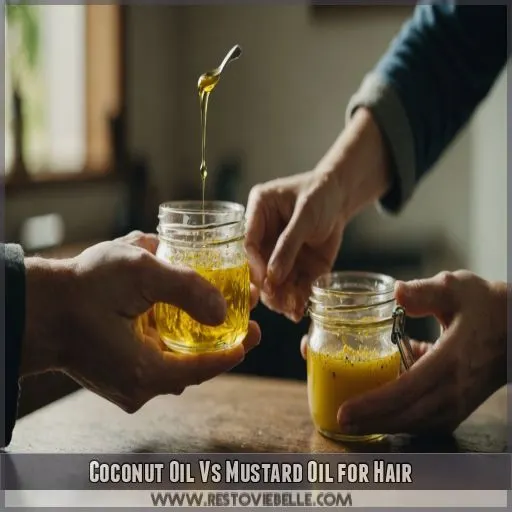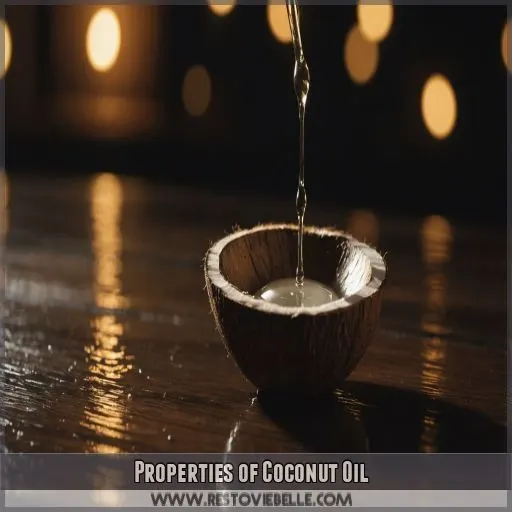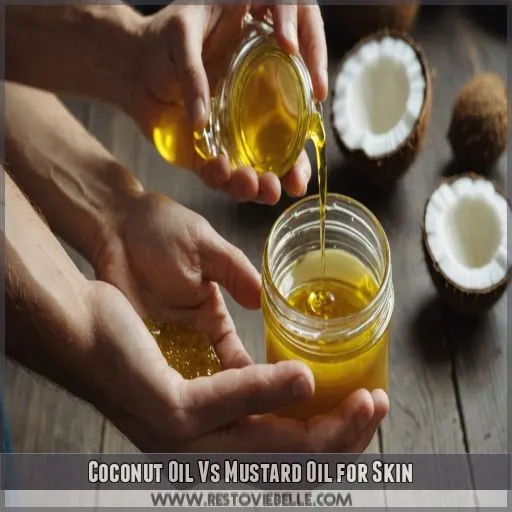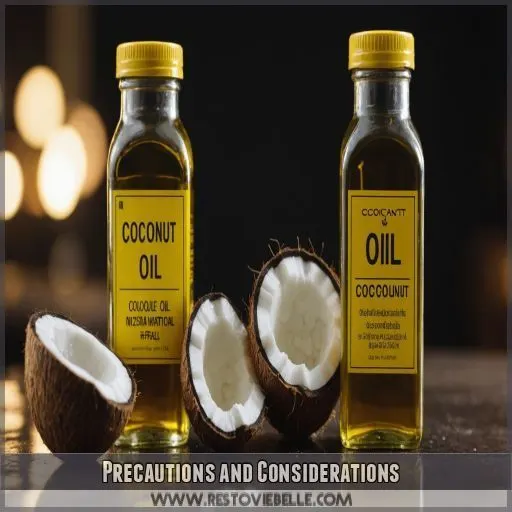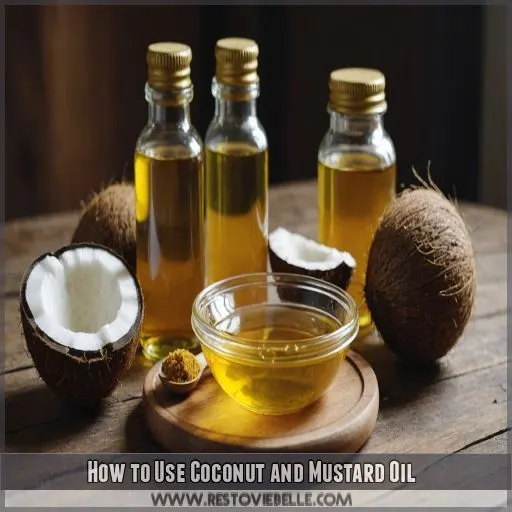This site is supported by our readers. We may earn a commission, at no cost to you, if you purchase through links.
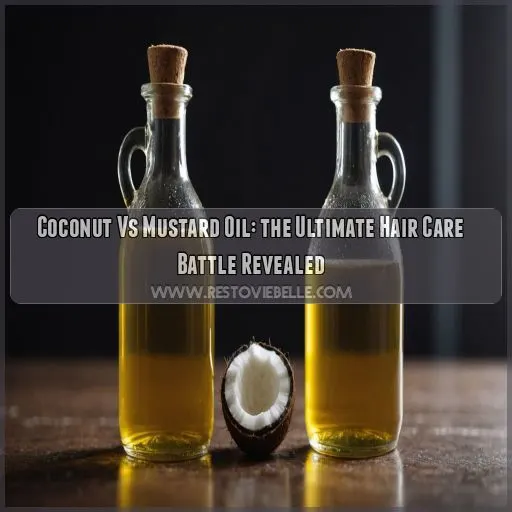 Coconut oil and mustard oil are both great for hair, but the best choice depends on your hair type and needs.
Coconut oil and mustard oil are both great for hair, but the best choice depends on your hair type and needs.
Coconut oil is a great choice for thin, dry, or damaged hair.
Its fatty acids deeply nourish and strengthen strands.
Mustard oil is ideal for thicker, curlier hair.
It stimulates circulation and promotes growth.
The key is to experiment and see which oil leaves your hair smoother, stronger, and more vibrant.
You can also mix and match these two powerhouse oils to create a customized blend just for you.
Intrigued? Read on to discover more about these hair heroes.
Table Of Contents
- Key Takeaways
- Coconut Oil Vs Mustard Oil for Hair
- Properties of Coconut Oil
- Properties of Mustard Oil
- Choosing the Right Oil for Your Hair
- Coconut Oil Vs Mustard Oil for Skin
- Precautions and Considerations
- How to Use Coconut and Mustard Oil
- Frequently Asked Questions (FAQs)
- Which is better for your hair coconut oil or mustard oil?
- Is mustard oil good for your hair?
- Which is the best oil for hair?
- Does mustard oil darken hair?
- How long should I use these oils for hair growth?
- Can mixing the oils enhance their benefits?
- Will using too much coconut oil cause dandruff?
- Is mustard oil safe to use during pregnancy?
- How often should I do a hot oil treatment with these oils?
- Conclusion
Key Takeaways
- Coconut oil works best for thin, dry, or damaged hair, while mustard oil excels for thicker, curlier hair, so experiment to find the right fit for your locks.
- Coconut oil’s fatty acids deeply nourish and strengthen strands, while mustard oil stimulates blood flow to your scalp to promote healthy growth. You can even mix the two for a custom hair care blend.
- Be mindful of any allergies or sensitivities, especially if you’re pregnant. Chat with your doctor to ensure these oils are safe for you before diving in.
- Don’t be afraid to get a little messy experimenting. The perfect hair solution is out there, just waiting for you to discover it. Keep an open mind and have fun finding your new oil soulmate.
Coconut Oil Vs Mustard Oil for Hair
When it comes to nourishing and strengthening your locks, coconut oil and mustard oil are both popular choices. But which one is the best for your hair? Let’s take a closer look at the unique benefits of each oil.
Benefits of Coconut Oil for Hair
Coconut oil is a true hair hero, delivering deep hydration and nourishment right where your strands need it most. Its medium-chain fatty acids penetrate the hair shaft, strengthening follicles and reducing breakage. Plus, coconut oil’s antibacterial properties can help prevent dandruff and keep your scalp healthy. Enjoy a lightweight, pleasant-smelling boost for thin, dry or damaged hair.
Benefits of Mustard Oil for Hair
Mustard oil is a traditional powerhouse for nourishing and strengthening hair. It’s rich in beneficial fatty acids like erucic acid and oleic acid, which deeply condition hair, stimulate scalp circulation, and help prevent premature graying. Say goodbye to dullness and breakage – mustard oil can reinvigorate your locks, leaving them shiny, strong, and full of life.
- Provides deep conditioning for thick, curly hair
- Stimulates blood flow to the scalp to promote growth
- Contains antioxidants that protect against sun damage
Comparison of Coconut and Mustard Oil for Hair
Looking for ways to give your hair some TLC? Coconut and mustard oils are both awesome for different reasons. Coconut oil is light and helps strengthen hair, cutting down on breakage. Mustard oil is thicker and gives your hair a deep conditioning treatment, plus it boosts blood flow to your scalp, which might help with growth.
Think about what your hair needs and give these oils a try. You might even find that a mix of both works best!
| Coconut Oil | Mustard Oil |
|---|---|
| Lightweight | Thick texture |
| Strengthening | Deep conditioning |
| Reduces breakage | Stimulates scalp |
| Moisturizing | Prevents graying |
Properties of Coconut Oil
If you’re curious about the inner workings of coconut oil, get ready to be amazed. From its rich fatty acid profile to its powerful antimicrobial properties, coconut oil is a true wonder for your hair.
Fatty Acid Composition of Coconut Oil
Coconut oil is packed with a unique blend of fatty acids, including lauric acid, myristic acid, palmitic acid, and stearic acid.
These fatty acids work together to nourish and fortify your hair, leaving it stronger, smoother, and more manageable.
The high concentration of monounsaturated fats in coconut oil also helps to hydrate your locks, preventing breakage and promoting a healthier scalp.
Antimicrobial Properties of Coconut Oil
Coconut oil’s antimicrobial properties are a superpower for your hair and skin. Thanks to the lauric acid, it can fight off pesky bacteria and fungi that cause scalp infections and skin issues. Just massage some coconut oil onto your locks or skin, and let its natural disinfecting powers work their magic. No more worrying about those nasty flare-ups!
Benefits of Medium-Chain Triglycerides (MCTs)
The medium-chain triglycerides (MCTs) in coconut oil can work wonders for your health. MCTs may aid weight loss, boost energy levels, and even improve heart health. Plus, their antimicrobial properties make coconut oil a superstar for keeping your hair and skin glowing. Tap into the power of MCTs and embrace the coconut-fueled life!
- MCTs may help you shed stubborn pounds by increasing calorie burn.
- MCT-rich coconut oil can give you an energizing kick without the crash.
- The healthy fats in MCTs can lower cholesterol and support cardiovascular wellness.
Hydration and Nourishment for Hair
If your hair is thirsty, coconut oil is the answer. This tropical treasure is packed with fatty acids that deeply condition parched strands, restoring moisture and delivering essential nutrients. Massage it into your scalp for a healthy glow, or use it as a luxurious hair mask – your dry, dull hair will drink it up.
Hair Growth and Strengthening
Coconut oil is a hair-care powerhouse for promoting hair growth and strengthening strands. The medium-chain fatty acids in coconut oil deeply nourish and moisturize the hair, reducing breakage and split ends. Massaging coconut oil into your scalp can also stimulate blood flow, encouraging healthier, stronger hair growth. Give your locks a dose of this natural wonder and watch them flourish!
Dandruff and Scalp Infection Prevention
Coconut oil’s antimicrobial properties can be a game-changer for your scalp health. Its lauric acid content helps fight bacteria and fungi, preventing dandruff and scalp infections. Incorporate coconut oil into your hair care routine through DIY masks or oil blends for a healthy, itch-free scalp. Ditch those harsh chemical treatments – let nature’s wonders work their magic!
- Antimicrobial properties fight bacteria and fungi
- Lauric acid content tackles dandruff and infections
- Incorporate coconut oil into hair care routines
- Avoid harsh chemicals for a healthy, itch-free scalp
Properties of Mustard Oil
Mustard oil is rich in monounsaturated and polyunsaturated fats, including the powerful erucic acid. These unique fatty acid components contribute to mustard oil’s impressive antioxidant and anti-inflammatory properties, making it a traditional remedy for promoting scalp health and hair growth.
Fatty Acid Composition of Mustard Oil
Mustard oil boasts a unique fatty acid profile that sets it apart from coconut oil. It’s rich in monounsaturated fatty acids like oleic acid and polyunsaturated fats like linoleic and omega-3s. This nutrient-dense composition gives mustard oil impressive moisturizing and nourishing properties for your hair and skin. It’s a versatile powerhouse you’ll want to add to your beauty routine.
Antioxidant and Anti-Inflammatory Properties
In addition to its fatty acid profile, mustard oil is rich in antioxidants and possesses powerful anti-inflammatory properties. These beneficial compounds can:
- Protect skin and hair from oxidative damage.
- Soothe inflammation and redness in the scalp.
- Promote healthy circulation to the hair follicles.
- Support the skin’s natural barrier function.
Benefits of Erucic Acid in Mustard Oil
Mustard oil contains erucic acid, which offers some surprising benefits for your hair. This fatty acid can stimulate blood flow to the scalp, nourishing your hair follicles and promoting thicker, healthier growth. It also has natural sun-protecting properties, shielding your locks from environmental damage. Embrace the power of erucic acid for hair that’s strong, vibrant, and full of life!
Deep Conditioning and Hair Growth
Mustard oil is all about deep conditioning. This versatile oil nourishes your hair from root to tip, sealing in moisture and promoting lush, healthy growth. Give your strands a rejuvenating boost by:
- Massaging mustard oil into your scalp for improved circulation.
- Using it in DIY hair masks for an intense conditioning treatment.
- Letting the omega-3s and vitamin E deeply penetrate your hair.
Scalp Stimulation and Hair Strengthening
Mustard oil’s deep conditioning properties nourish hair follicles and stimulate scalp circulation, promoting healthy hair growth. The oil’s amino acids and antioxidants strengthen hair strands, reducing breakage and fall. Gently massaging the scalp with mustard oil boosts nutrient absorption and oxygen flow, reviving dull, lifeless locks. Give your mane a dose of natural rejuvenation with this traditional treasure.
| Scalp Stimulation | Hair Strengthening |
|---|---|
| Increases blood circulation | Adds strength and luster |
| Delivers nutrients to hair follicles | Reduces breakage and split ends |
| Promotes healthy hair growth | Prevents hair loss and thinning |
| Invigorates the scalp | Restores hair health |
Prevention of Premature Graying
Mustard oil’s antioxidant-rich profile may help fend off premature graying. The oil’s high vitamin E content supports melanin production, which gives your hair its natural color. By nourishing hair follicles and improving blood flow to the scalp, mustard oil can prevent stressed-induced graying and restore your youthful hue. Embrace this traditional ayurvedic secret for vibrant, long-lasting hair color.
Choosing the Right Oil for Your Hair
Choosing the right oil for your hair can be tricky, but don’t worry – we’re here to help. Whether you’re team coconut or team mustard, experimenting with these natural oils is the key to finding your perfect hair care match.
Hair Type and Oil Selection
When choosing between coconut and mustard oil for your hair, consider your hair type. Coconut oil works best for thin, low-porosity hair that needs protein replenishment without damage. Mustard oil excels for curly, thick hair that craves deep conditioning. Experiment to see which oil your strands respond to best for nourishment, growth, and shine.
Experimenting With Coconut and Mustard Oil
Experimenting with coconut and mustard oil can be a fun hair care adventure! Try a patch test first to see how your scalp and strands react. See the chart below to get started on finding your perfect oil match. Don’t be afraid to mix and match – a little trial and error can lead to hair happiness.
| Hair Type | Coconut Oil | Mustard Oil |
|---|---|---|
| Fine/Thin | ✓ | |
| Thick/Coarse | ✓ | |
| Dry/Damaged | ✓ | ✓ |
Mixing Oils for a Blend of Benefits
Curious to get the best of both worlds? Try mixing coconut and mustard oils for a hair care dream team. Coconut’s lightweight moisture meets mustard’s deep conditioning – a dynamic duo that nourishes, strengthens, and protects your luscious locks. Experiment with different ratios to find the perfect blend for your unique hair type and needs.
Coconut Oil Vs Mustard Oil for Skin
Debating whether coconut oil or mustard oil is better for your skin? Both oils offer unique benefits, so it’s worth understanding how they compare. Discover the surprising ways these natural wonders can transform your complexion.
Benefits of Coconut Oil for Skin
Coconut oil is a skin superfood! Its medium-chain fatty acids and vitamin E work wonders, deeply hydrating dry skin and improving the skin’s protective barrier. It even fights acne and wrinkles with its antibacterial and anti-aging properties. Just a dab can leave your complexion glowing. Discover the beauty benefits of this versatile oil today.
Benefits of Mustard Oil for Skin
Mustard oil offers a treasure trove of skin benefits. Its high concentration of vitamin E, antioxidants, and omega-3 fatty acids can work wonders, brightening your complexion, fading dark spots, and reducing the appearance of fine lines. Plus, the anti-inflammatory properties may help soothe breakouts and calm irritated skin. Give your skin the royal treatment with the power of mustard oil.
Comparison of Coconut and Mustard Oil for Skin
Both coconut oil and mustard oil are great for skin, but they work differently. Coconut oil is a superstar for moisturizing, while mustard oil fights inflammation and brightens skin. It all boils down to what your skin needs. One of these oils could be your secret weapon! Try them out and see what works best for you.
- Coconut oil: Deeply hydrates dry, damaged skin
- Mustard oil: Helps fade dark spots and even skin tone
- Coconut oil: May clog pores in oily/acne-prone skin
- Mustard oil: Can cause irritation in sensitive skin types
Precautions and Considerations
While both coconut and mustard oil offer hair benefits, it’s important to be aware of any allergies or sensitivities you may have. Pregnant women should also be cautious when using these oils, as some compounds may pose risks. Always consult your healthcare provider before incorporating these oils into your routine.
Allergies and Sensitivities to Coconut Oil
Coconut oil may seem like a miracle, but it ain’t for everyone. Some folks are just allergic to the stuff, ya know? If your skin starts acting up or you feel like your throat’s closing in, back off and talk to your doc. They can help you figure out if coconut oil is the culprit and suggest safer alternatives that won’t have you feeling like a hot mess.
| Symptoms of Coconut Oil Allergy | Causes |
|---|---|
| Redness, Itching, Swelling | Allergic reaction to protein in coconut oil |
| Hives, Eczema, Dermatitis | Skin sensitivity to fatty acids in coconut oil |
| Digestive Issues, Nausea | Intolerance to medium-chain triglycerides (MCTs) |
| Breathing Problems, Anaphylaxis | Severe immune response to coconut oil components |
| Cross-Reactivity with Other Foods | Shared allergens between coconut and other tree nuts |
Allergies and Sensitivities to Mustard Oil
Be cautious with mustard oil if you have mustard allergies – it can trigger skin rashes, hives, or even respiratory issues. Some people with sensitivities may experience stinging, redness, or blisters. If you react, try substituting with a gentler oil like coconut. Always do a patch test first to check for any adverse reactions.
Pregnancy and Breastfeeding Precautions
During pregnancy and breastfeeding, it’s best to steer clear of mustard oil – it contains compounds that could potentially cause harm. But don’t sweat it, coconut oil is a gentler option for your hair and skin. Just chat with your doc to make sure it’s the right fit for you and your little one.
How to Use Coconut and Mustard Oil
Want to get the most out of coconut and mustard oil for your hair and skin? Don’t worry – we’ve got tips to help you use these natural oils safely and effectively. Whether you’re a coconut oil fan or a mustard oil enthusiast, we’ll help you find the right way to use them for your unique needs.
Using Coconut Oil for Hair and Skin
Coconut oil is a versatile, natural wonder that can work wonders for your hair and skin.
It can deeply nourish and moisturize dry, damaged tresses when massaged gently into your scalp.
You can also use it as a pre-shampoo treatment or incorporate it into DIY hair masks.
On the skin, coconut oil acts as a soothing, anti-inflammatory moisturizer, perfect for treating conditions like acne and eczema.
Using Mustard Oil for Hair and Skin
Using mustard oil for your hair is easy! Just massage a few drops onto your scalp to nourish those follicles and boost growth.
For a luxurious hair mask, mix mustard oil with yogurt and honey – your tresses will drink it up!
Mustard oil can also work wonders for your skin, evening out tone and keeping your complexion glowing.
Tips for Safe and Effective Use
When using coconut or mustard oil, be mindful of any skin sensitivities. Store oils in airtight containers away from heat and light. Apply oils 1-2 times per week, adjusting for your hair porosity. Dilute with a carrier oil if needed. With some trial and error, you’ll uncover the perfect oil regime for your luscious locks!
Choosing the Best Oil for Your Needs
With so many options, how do you know which oil is best for your unique hair and skin needs? The key is to experiment and find the perfect balance. Consider your hair type, texture, and any specific concerns like dryness or damage. Then, try mixing coconut and mustard oils to create a customized blend that nourishes your locks and complexion.
Encouragement to Experiment and Find What Works Best
Finding the best oil for your hair can be a bit of a journey! Try out coconut oil, mustard oil, or even blend them together to see what works wonders for your unique hair type and needs. Don’t be afraid to get a little messy – the perfect hair solution is out there, waiting for you to discover it!
Frequently Asked Questions (FAQs)
Which is better for your hair coconut oil or mustard oil?
Coconut oil and mustard oil both have hair benefits, but to figure out which one suits you best, you’ll need to try them and see which one really hits the sweet spot for your locks.
Is mustard oil good for your hair?
Mustard oil is a superstar for your hair. It deeply conditions, strengthens strands, and promotes healthy growth. Just be sure to use it in moderation – a little goes a long way! Your locks will thank you.
Which is the best oil for hair?
Choosing the best hair oil is like picking the perfect sidekick – coconut oil is your loyal, moisturizing bestie, while mustard oil is your spicy, scalp-revitalizing wingman. Try both to see which one your locks love most!
Does mustard oil darken hair?
Mustard oil can indeed darken hair over time, thanks to its rich antioxidant and mineral profile. But it’s important to use it sparingly, as over-application may lead to scalp irritation. Listen to your hair’s needs and find the right balance.
How long should I use these oils for hair growth?
For hair growth, consistency is key. Try using coconut or mustard oil regularly for at least 3-6 months to see noticeable results. Be patient – healthy hair takes time to grow!
Can mixing the oils enhance their benefits?
勞 Listen up, mixing coconut and mustard oils is like a superhero team-up – the benefits are off the charts! Get ready for hair so strong and shiny, it’ll have your strands doing backflips. Go on, get mixing!
Will using too much coconut oil cause dandruff?
Using too much coconut oil can actually worsen dandruff! The saturated fats in coconut oil may clog pores and upset the scalp’s natural balance. Moderation is key – a little goes a long way for healthy, dandruff-free hair.
Is mustard oil safe to use during pregnancy?
While mustard oil is generally safe during pregnancy, it’s best to consult your doctor first. Mustard oil contains compounds that could potentially harm the baby, so it’s important to get professional advice before using it.
How often should I do a hot oil treatment with these oils?
For the best results, aim to do a hot oil treatment with coconut or mustard oil 1-2 times per week. This nourishes your hair, boosts growth, and prevents damage. Start with what works best for your hair type!
Conclusion
Ultimately, the choice between coconut and mustard oil for your hair depends on your unique needs.
Coconut oil shines for thin, dry strands.
Mustard oil excels for thicker, curlier hair.
The key is to experiment and find the oil or blend that leaves your locks smoother, stronger, and more vibrant.
Whether you opt for coconut, mustard, or a customized mix, the right hair oil can work wonders.

